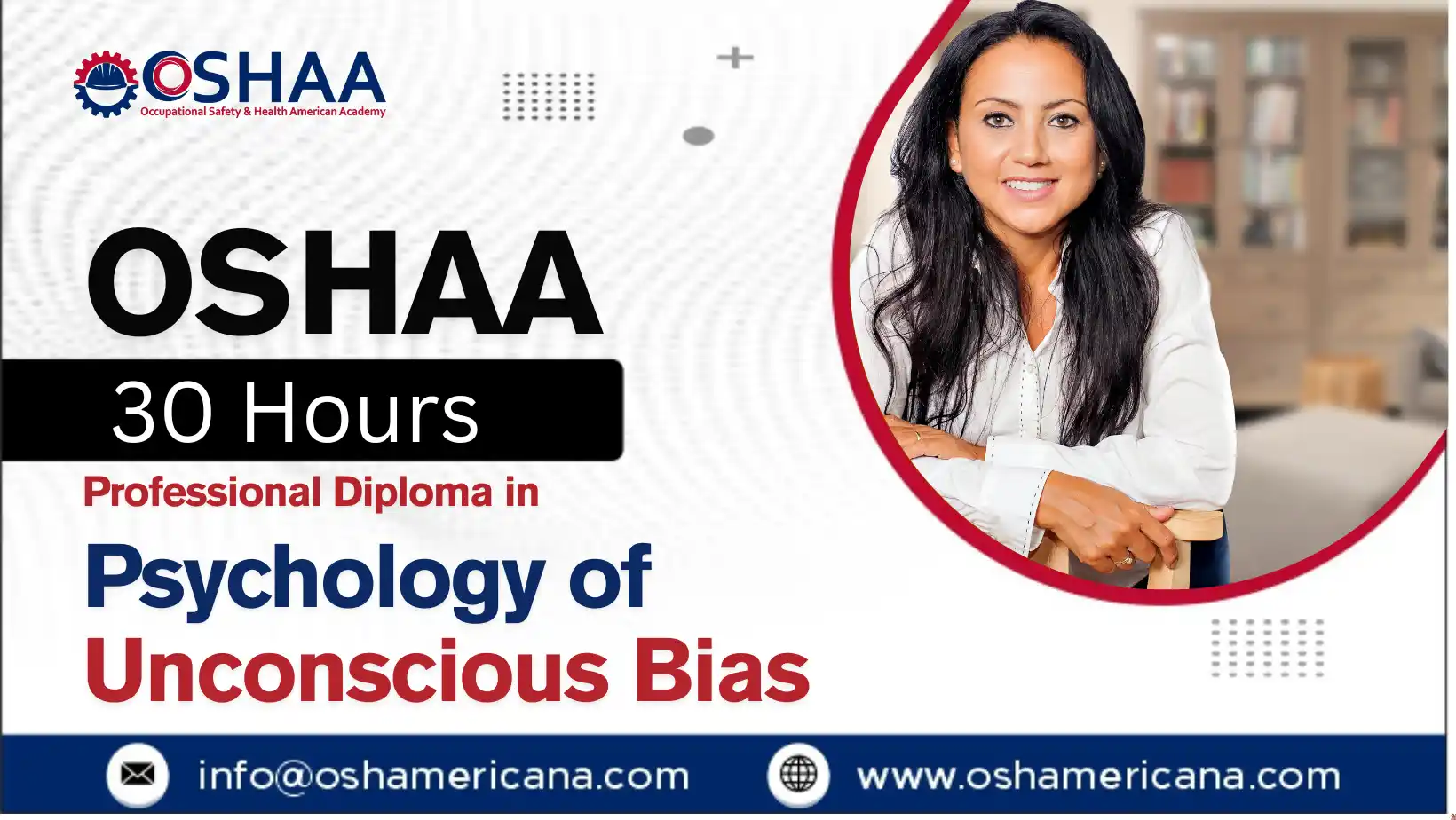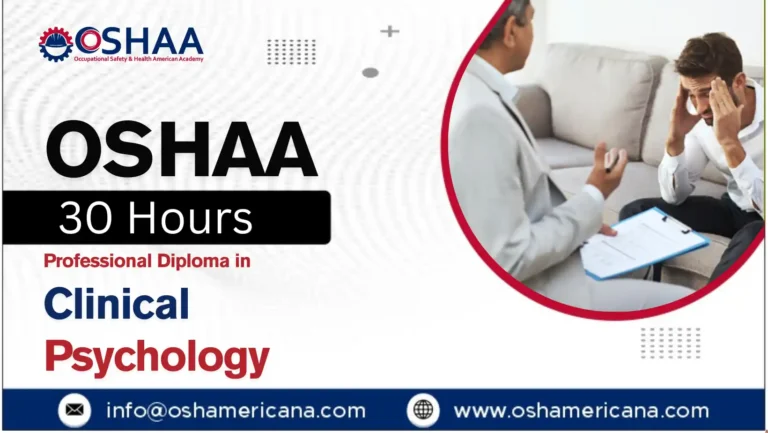In today’s fast-paced and increasingly diverse professional landscape, understanding the subtle and often hidden influences of unconscious bias has never been more critical. The OSHAA 30-Hours Professional Diploma in Psychology of Unconscious Bias offers a focused and expertly structured qualification designed for individuals seeking to foster inclusivity, improve workplace culture, and make informed, bias-aware decisions in both professional and social environments.
This diploma explores the psychological foundations of unconscious bias, offering participants a deeper understanding of how hidden attitudes, stereotypes, and social conditioning can influence perception, judgement, and behaviour. Whether working in corporate, educational, healthcare, or governmental sectors, participants will find the course content highly relevant and immediately applicable to real-world settings.
The OSHAA accreditation further enhances the value of this qualification, ensuring it meets rigorous industry standards and is recognised across multiple professional domains. This makes the diploma an excellent choice for those aiming to advance careers in human resources, training and development, compliance, or leadership roles that demand a high level of emotional intelligence and social responsibility.
Upon completion of the course, participants will be equipped to contribute positively to workplace equity initiatives, serve as advocates for inclusive practices, and support their organisations in creating environments where diverse talent can thrive.
OSHAA 30-Hours Professional Diploma in Psychology of Unconscious Bias
Study Units
Learning Outcomes
Introduction to Unconscious Bias and Implicit Cognition (3 Hours)
- Define unconscious bias and differentiate it from conscious prejudice
- Explain the concept of implicit cognition and its role in everyday decision-making
- Identify how unconscious bias operates within various social and professional contexts
- Recognise the significance of addressing unconscious bias in modern workplaces
Psychological Roots of Stereotyping and Prejudice (5 Hours)
- Examine key psychological theories underpinning stereotyping and prejudice
- Understand the formation and reinforcement of social categorisation
- Analyse the influence of early experiences and group dynamics on biased thinking
- Evaluate how stereotypes impact individual behaviour and group relations
Types and Manifestations of Unconscious Bias (5 Hours)
- Identify common types of unconscious bias, such as affinity bias, confirmation bias, and halo effect
- Explore how these biases manifest in verbal, non-verbal, and institutional behaviour
- Illustrate examples of bias in different professional sectors
- Reflect on personal susceptibility to various forms of unconscious bias
Unconscious Bias in Workplace Decision-Making (3 Hours)
- Assess the impact of unconscious bias on recruitment, promotion, and evaluation processes
- Understand the hidden barriers bias can create in leadership and team development
- Learn practical approaches to minimise bias in workplace decision-making
- Apply critical thinking to identify bias-influenced outcomes in case studies
The Neuroscience of Bias: Brain, Perception, and Behaviour (3 Hours)
- Explore the neurological processes linked to implicit bias
- Understand how perception and memory contribute to biased behaviour
- Identify the role of emotional and cognitive shortcuts in the brain
- Relate neuroscience findings to practical methods for reducing bias
Cultural Conditioning and Social Identity Theory (3 Hours)
- Define cultural conditioning and explain its effect on thought patterns and bias
- Understand social identity theory and its relevance to in-group and out-group dynamics
- Analyse how cultural norms shape unconscious judgements
- Recognise the intersectionality of identity and its influence on bias perception
Recognising and Mitigating Bias in Organisational Practices (5 Hours)
- Identify bias in institutional systems, processes, and culture
- Develop strategies to audit and redesign biased organisational practices
- Understand the role of leadership in promoting equity and inclusion
- Create action plans for sustainable bias mitigation within professional settings
Inclusive Communication and Behavioural Change Strategies (3 Hours)
- Practise inclusive language and empathetic listening skills
- Identify communication patterns that reinforce or challenge bias
- Apply behavioural science principles to encourage inclusive conduct
- Design interventions that promote conscious awareness and inclusive engagement
Course Benefits – OSHAA 30-Hours Professional Diploma in Psychology of Unconscious Bias
- Enhances understanding of the psychological mechanisms behind unconscious bias, enabling participants to make more informed and equitable decisions.
- Equips participants with practical strategies to identify and mitigate bias in professional environments, particularly in recruitment, leadership, and team dynamics.
- Strengthens inclusive communication skills, fostering a respectful and culturally aware workplace culture.
- Develops critical thinking and self-reflective practices that support long-term behavioural change and ethical accountability.
- Offers a neuroscience-informed perspective on bias, linking theory to real-world application in policy and practice.
- Supports the development of inclusive leadership capabilities, crucial for those in managerial, HR, and training roles.
- Provides internationally recognised OSHAA certification, enhancing professional credibility and career advancement opportunities.
- Encourages proactive engagement in equity, diversity, and inclusion (EDI) initiatives within organisations.
- Builds the confidence to challenge discriminatory practices and advocate for positive change.
- Promotes lifelong learning and continuous professional development in line with UK and global standards for inclusive practice.
The OSHAA 30-Hours Professional Diploma in Psychology of Unconscious Bias is designed for professionals across all sectors who are committed to fostering equity, inclusion, and fair decision-making within their organisations. It is particularly beneficial for:
- Human resource professionals involved in recruitment, employee relations, and policy development
- Managers, team leaders, and supervisors responsible for leading diverse teams
- Educators, trainers, and learning and development specialists aiming to create inclusive learning environments
- Healthcare and social care professionals working with diverse communities
- Public sector employees involved in governance, community engagement, or service delivery
- Legal and compliance professionals concerned with ethical and anti-discriminatory practices
- Individuals in corporate, academic, or non-profit sectors seeking to enhance their cultural competence and leadership effectiveness
This course is ideal for participants who wish to gain a deeper psychological understanding of bias, build inclusive practices, and lead with integrity in today’s diverse and dynamic professional landscape.







